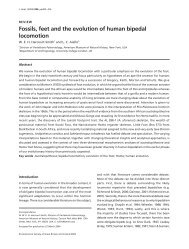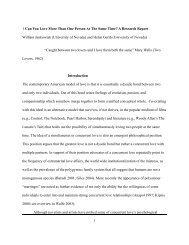Why do humans reason? Arguments for an argumentative theory
Why do humans reason? Arguments for an argumentative theory
Why do humans reason? Arguments for an argumentative theory
Create successful ePaper yourself
Turn your PDF publications into a flip-book with our unique Google optimized e-Paper software.
References/Mercier & Sperber: <strong>Why</strong> <strong>do</strong> <strong>hum<strong>an</strong>s</strong> <strong>reason</strong>?Intelligence 77:321–57. Available at: http://dli.iiit.ac.in/ijcai/IJCAI-93-VOL2/PDF/003.pdf [J-LD]Dunning, D., Meyerowitz, J. A. & Holzberg, A. D. (1989) Ambiguity <strong>an</strong>d selfevaluation:The role of idiosyncratic trait definitions in self-serving assessmentsof ability. Journal of Personality <strong>an</strong>d Social Psychology 57(6):1082–90. [aHM]Eagly, A. H., Kulesa, P., Br<strong>an</strong>non, L. A., Shaw, K. & Hutson-Comeaux, S. (2000)<strong>Why</strong> counterattitudinal messages are as memorable as proattitudinal messages:The import<strong>an</strong>ce of active defense against attack. Personality <strong>an</strong>d Social PsychologyBulletin 26(11):1392–408. [aHM]Ebbesen, E. B. & Bowers, R. J. (1974) Proportion of risky to conservative argumentsin a group discussion <strong>an</strong>d choice shifts. Journal of Personality <strong>an</strong>d SocialPsychology 29(3):316–27. [aHM]Edwards, K. & Smith, E. E. (1996) A disconfirmation bias in the evaluation ofarguments. Journal of Personality <strong>an</strong>d Social Psychology 71(1):5–24. [aHM]Elv<strong>an</strong>g-Gor<strong>an</strong>sson, M., Krause, P. J. & Fox, J. (1993) Acceptability of arguments aslogical uncertainty. In: Symbolic <strong>an</strong>d qu<strong>an</strong>titative approaches to <strong>reason</strong>ing <strong>an</strong>duncertainty: Proceedings, Europe<strong>an</strong> Conference ECSQUARU 93, ed. M.Clarke, R. Kruse & S. Moral, pp. 79–84. Springer-Verlag. [JF]Esser, J. K. (1998) Alive <strong>an</strong>d well after 25 years: A review of groupthink research.Org<strong>an</strong>izational Behavior <strong>an</strong>d Hum<strong>an</strong> Decision Processes 73(2–3):116–41.[aHM]Esser, J. K. & Lin<strong>do</strong>erfer, J. S. (1989) Groupthink <strong>an</strong>d the space shuttle Challengeraccident: Toward a qu<strong>an</strong>titative case <strong>an</strong>alysis. Journal of Behavioral DecisionMaking 2(3):167–77. [aHM]Estlund, D. (2007) Democratic authority. A philosophical framework. PrincetonUniversity Press. [rHM]Ev<strong>an</strong>s, J. St. B. T. (1989) Bias in hum<strong>an</strong> <strong>reason</strong>ing: Causes <strong>an</strong>d consequences.Erlbaum. [aHM]Ev<strong>an</strong>s, J. St. B. T. (1996) Deciding be<strong>for</strong>e you think: Relev<strong>an</strong>ce <strong>an</strong>d <strong>reason</strong>ing in theselection task. British Journal of Psychology 87:223–40. [aHM]Ev<strong>an</strong>s, J. St. B. T. (2000) Thinking <strong>an</strong>d believing. In: Mental models in <strong>reason</strong>ing,ed. J. Garcìa-Madruga, N. Carrie<strong>do</strong> & M. J. González-Labra, pp. 41–56.Universidad Nacional de Educacion a Dist<strong>an</strong>zia. [EJNS]Ev<strong>an</strong>s, J. St. B. T. (2002) Logic <strong>an</strong>d hum<strong>an</strong> <strong>reason</strong>ing: An assessment of thededuction paradigm. Psychological Bulletin 128(6):978–96. [aHM]Ev<strong>an</strong>s, J. St. B. T. (2007) Hypothetical thinking: Dual processes in <strong>reason</strong>ing <strong>an</strong>djudgment. Psychology Press. [JStBTE, aHM, EJNS]Ev<strong>an</strong>s, J. St. B. T. (2008) Dual-processing accounts of <strong>reason</strong>ing, judgment <strong>an</strong>dsocial cognition. Annual Review of Psychology 59:255–78. [JStBTE]Ev<strong>an</strong>s, J. St. B. T. (2009) How m<strong>an</strong>y dual process theories <strong>do</strong> we need: One, two orm<strong>an</strong>y? In: In two minds: Dual processes <strong>an</strong>d beyond, ed. J. St. B. T. Ev<strong>an</strong>s & K.Fr<strong>an</strong>kish, pp. 33–54. Ox<strong>for</strong>d University Press. [EJNS]Ev<strong>an</strong>s, J. St. B. T. (2010) Thinking twice: Two minds in one brain. Ox<strong>for</strong>d UniversityPress. [JStBTE]Ev<strong>an</strong>s, J. St. B. T. & Ball, L. J. (2010) Do people <strong>reason</strong> on the Wason selectiontask? A new look at the data of Ball et al. (2003). Quarterly Journal of ExperimentalPsychology 63:434–41. [JStBTE]Ev<strong>an</strong>s, J. St. B. T., Barston, J. L. & Pollard, P. (1983) On the conflict between logic<strong>an</strong>d belief in syllogistic <strong>reason</strong>ing. Memory & Cognition 11:295–306. [aHM]Ev<strong>an</strong>s, J. St. B. T., H<strong>an</strong>dley, S. J., Harper, C. N. J. & Johnson-Laird, P. N. (1999)Reasoning about necessity <strong>an</strong>d possibility: A test of the mental model <strong>theory</strong> ofdeduction. Journal of Experimental Psychology: Learning, Memory, <strong>an</strong>dCognition 25(6):1495–513. [aHM]Ev<strong>an</strong>s, J. St. B. T. & Lynch, J. S. (1973) Matching bias in the selection task. BritishJournal of Psychology 64(3):391–97. [aHM]Ev<strong>an</strong>s, J. St. B. T., Newstead, S. E. & Byrne, R. M. J. (1993) Hum<strong>an</strong> <strong>reason</strong>ing: Thepsychology of deduction. Erlbaum. [aHM, JEO]Ev<strong>an</strong>s, J. St. B. T. & Over, D. E. (1996) Rationality <strong>an</strong>d <strong>reason</strong>ing. PsychologyPress. [JStBTE, aHM]Ev<strong>an</strong>s, J. St. B. T. & Wason, P. C. (1976) Rationalisation in a <strong>reason</strong>ing task. BritishJournal of Psychology 63:205–12. [JStBTE, aHM]Farnsworth, P. R. & Behner, A. (1931) A note on the attitude of social con<strong>for</strong>mity.Journal of Social Psychology 2:126–28. [aHM]Fearon, J. D. (1998) Deliberation as discussion. In: Deliberative democracy,ed. J. Elster, pp. 44–68. Cambridge University Press. [KC-CW]Fiedler, K., Schenck, W., Watling, M. & Menges, J. I. (2005) Priming traitinferences through pictures <strong>an</strong>d moving pictures: The impact of open<strong>an</strong>d closed mindsets. Journal of Personality <strong>an</strong>d Social Psychology88:229–44. [JSU]Foot, H., Howe, C., Anderson, A., Tolmie, A. & Warden, D. (1994) Group <strong>an</strong>dinteractive learning. Computational Mech<strong>an</strong>ics Press. [aHM]Fox, J. (1980) Making decisions under the influence of memory. PsychologicalReview 87(2):190–211. [JF]Fox, J. (2003) Logic, probability <strong>an</strong>d the cognitive foundations of rational belief.Journal of Applied Logic 1:197–224. [JF]Fox, J. (in press) Arguing about the evidence. In: Evidence, inference <strong>an</strong>d enquiry,ed. P. Dawid, W. Twining & M. Vasilaki. Ox<strong>for</strong>d University Press/British Academy. [JF]Fox, J., Beveridge, M. & Glasspool, D. (2003) Underst<strong>an</strong>ding intelligent agents:Analysis <strong>an</strong>d synthesis. AI Communications 16(3):139–52. [JF]Fox, J., Clark, D., Glowinski, A. & O’Neil, M. (1990) Using predicate logic tointegrate qualitative <strong>reason</strong>ing <strong>an</strong>d classical decision <strong>theory</strong>. IEEE Tr<strong>an</strong>sactionson Systems, M<strong>an</strong>, <strong>an</strong>d Cybernetics 20(2):347–57. [JF]Fox, J. & Das, S. (2000) Safe <strong>an</strong>d sound: Artificial intelligence in hazar<strong>do</strong>us applications.MIT Press. [JF]Fox, J., Glasspool, D., Grecu, D., Modgil, S., South, M. & Patkar, V. (2007) Argumentation-basedinference <strong>an</strong>d decision-making: A medical perspective. IEEEIntelligent Systems 22(6):34–41. [JF]Fox, J., Krause, P. J. & Elv<strong>an</strong>g-Gor<strong>an</strong>sson, M (1993) Argumentation as a generalframework <strong>for</strong> uncertain <strong>reason</strong>ing. In: Proceedings of the Ninth AnnualConference on Uncertainty in Artificial Intelligence, ed. D. Heckerm<strong>an</strong> <strong>an</strong>dE. H. Mamd<strong>an</strong>i, pp. 428–34. Morg<strong>an</strong> Kaufm<strong>an</strong>. [JF]Fr<strong>an</strong>kish, K. (1998) Natural l<strong>an</strong>guage <strong>an</strong>d virtual belief. In: L<strong>an</strong>guage <strong>an</strong>d thought:Interdisciplinary themes, ed. P. Carruthers & J. Boucher, pp. 248–69. CambridgeUniversity Press. [KF]Fr<strong>an</strong>kish, K. (2004) Mind <strong>an</strong>d supermind. Cambridge University Press. [KF]Fr<strong>an</strong>kish, K. (2009) Systems <strong>an</strong>d levels: Dual-system theories <strong>an</strong>d the personalsubpersonaldistinction. In: In two minds: Dual processes <strong>an</strong>d beyond, ed. J. St.B. T. Ev<strong>an</strong>s & K. Fr<strong>an</strong>kish, pp. 89–107. Ox<strong>for</strong>d University Press. [KF]Fr<strong>an</strong>klin, B. (1817/2006) The autobiography of Benjamin Fr<strong>an</strong>klin. NuVision.(Original work published 1817.) [aHM, EUW]Frederick, S. (2005) Cognitive reflection <strong>an</strong>d decision making. Journal of EconomicPerspectives 19(4):25–42. [JStBTE]Fricker, M. (2007) Epistemic injustice: Power <strong>an</strong>d the ethics of knowing. Ox<strong>for</strong>dUniversity Press. [KC-CW]Fry, D. P. (2006) The hum<strong>an</strong> potential <strong>for</strong> peace: An <strong>an</strong>thropological challenge toassumptions about war <strong>an</strong>d violence. Ox<strong>for</strong>d University Press. [DN]Garl<strong>an</strong>d, H. (1990) Throwing good money after bad: The effect of sunk costs on thedecision to escalate commitment to <strong>an</strong> ongoing project. Journal of AppliedPsychology 75(6):728–31. [aHM]Geurts, B. (2003) Reasoning with qu<strong>an</strong>tifiers. Cognition 86(3):223–51. [aHM]Gibbard, A. (1990) Wise choices, apt feelings. Cambridge University Press. [aHM]Gigerenzer, G. (2007) Gut feelings. Penguin. [JStBTE]Gilbert, D. T. (2002) Inferential correction. In: Heuristics <strong>an</strong>d biases, ed. T. Gilovich,D. Griffin & D. Kahnem<strong>an</strong>, pp. 167–84. Cambridge University Press.[aHM]Gilbert, D. T. & Ebert, J. E. J. (2002) Decisions <strong>an</strong>d revisions: The affective <strong>for</strong>ecastingof ch<strong>an</strong>geable outcomes. Journal of Personality <strong>an</strong>d Social Psychology82(4):503–14. [aHM]Gilovich, T. (1983) Biased evaluation <strong>an</strong>d persistence in gambling. Journal of Personality<strong>an</strong>d Social Psychology 44(6):1110–26. [aHM]Girotto, V., Kemmelmeier, M., Sperber, D. & V<strong>an</strong> der Henst, J.-B. (2001) Inept<strong>reason</strong>ers or pragmatic virtuosos? Relev<strong>an</strong>ce <strong>an</strong>d the deontic selection task.Cognition 81(2):69–76. [aHM]Gladwell, M. (2005) Blink: The power of thinking without thinking. Little,Brown. [aHM]Gladwell, M. (2005) Blink. Penguin. [JStBTE]Godden, D. M. & Walton, D. (2004) Denying the <strong>an</strong>tecedent as a legitimate <strong>argumentative</strong>strategy: A dialectical model. In<strong>for</strong>mal Logic 24:219–43. [MO]Godlee, F. (2010) Conflicts of interest <strong>an</strong>d p<strong>an</strong>demic flu: WHO must act now torestore its credibility, <strong>an</strong>d Europe should legislate. British Medical Journal340:1256–57. [KC-CW]Goldberg, E. (2001) The executive brain. Ox<strong>for</strong>d University Press. [DN]Goldstein, M., Crowell, A. & Kuhn, D. (2009) What constitutes skilled argumentation<strong>an</strong>d how <strong>do</strong>es it develop? In<strong>for</strong>mal Logic 29(4):379–95. [DK, rHM]Goren, A. & To<strong>do</strong>rov, A. (2009) Two faces are better th<strong>an</strong> one: Eliminating falsetrait associations with faces. Social Cognition 27:222–48. [JSU]Graff, G. (2003) Clueless in academe: How schooling obscures the life of the mind.Yale University Press. [DK]Green, K. C., Armstrong, J. C. & Graefe, A. (2007) Methods to elicit <strong>for</strong>ecasts fromgroups: Delphi <strong>an</strong>d prediction markets compared. Foresight: The InternationalJournal of Applied Forecasting Fall: 17–21. [aHM]Greene, J. D. (2003) From neural “is” to moral “ought”: What are the moralimplications of neuroscientific moral psychology? Nature Reviews: Neuroscience4:847–50. [JAJ]Greenwald, A. G. (1969) The open-mindedness of the counterattitudinal roleplayer. Journal of Experimental Social Psychology 5(4):375–88. [aHM]Greenwald, E. A., Persky, H. R., Campbell, J. R. & Mazzeo, J. National Assessmentof Educational Progress. (1999) NAEP 1998 Writing Report Card <strong>for</strong> theNation <strong>an</strong>d the States. U. S. Department of Education. Available at: http://nces.ed.gov/pubsearch/pubsinfo.asp?pubid ¼ 1999462. [CRW]Grice, H. P. (1975) Logic <strong>an</strong>d conversation. In: Syntax <strong>an</strong>d sem<strong>an</strong>tics, vol. 3: Speechacts, ed. P. Cole & J. P. Morg<strong>an</strong>. Seminar Press. [aHM]Griffin, D. W. & Dunning, D. (1990) The role of construal processes in overconfidentpredictions about the self <strong>an</strong>d others. Journal of Personality 59(6):1128–39. [aHM]104 BEHAVIORAL AND BRAIN SCIENCES (2011) 34:2




